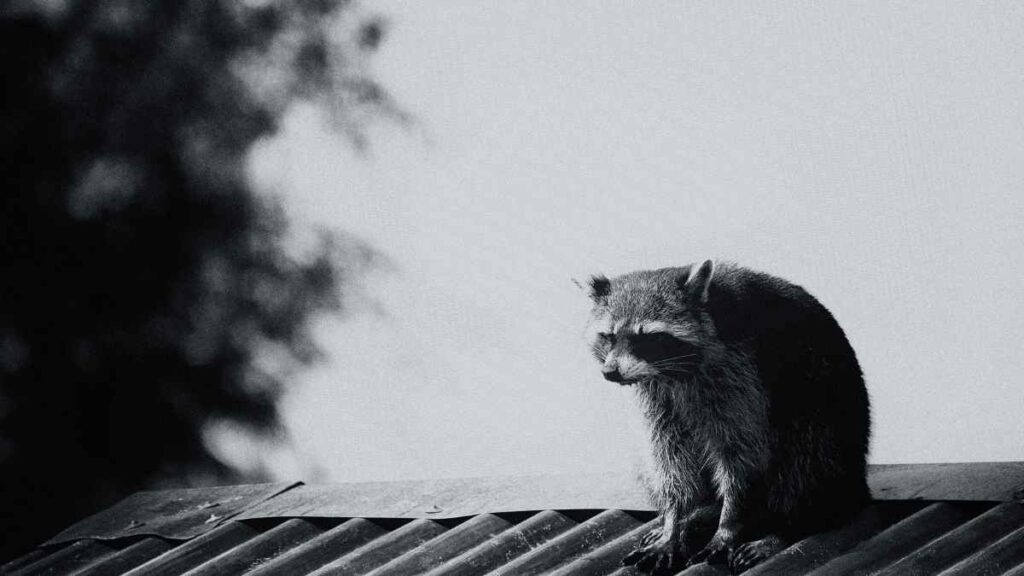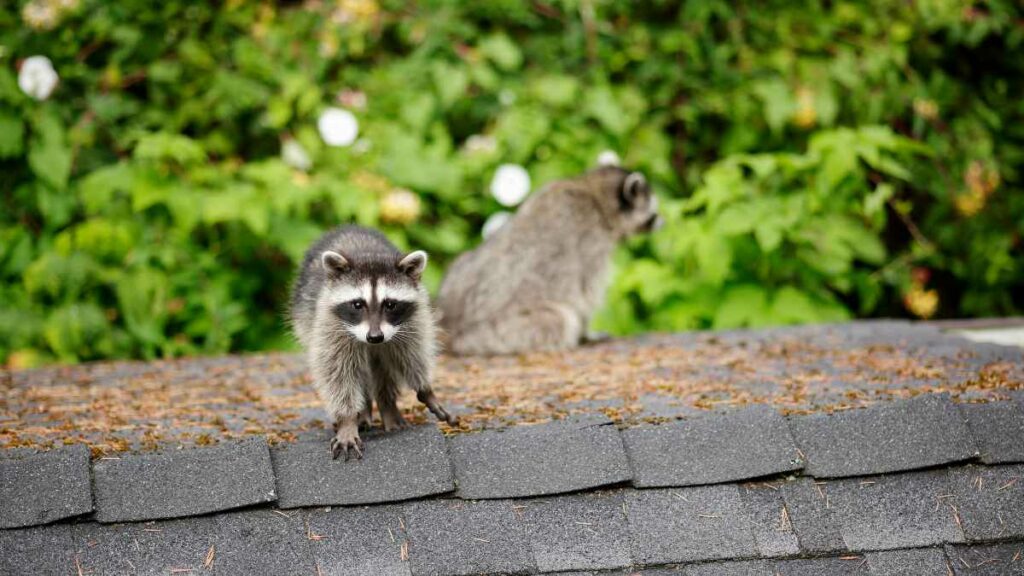Are you tired of being woken up in the middle of the night by the sound of raccoons rummaging through your trash cans or scurrying around in your attic?
Not only can these adorable creatures cause a significant amount of damage to your property, but they also pose a health risk to you and your family. The good news is you don’t have to live with raccoons invading your home.
You can keep these critters out for good by eliminating their entry points. In this blog post, we’ll take a comprehensive and step-by-step approach to removing raccoon entry points, so you can sleep soundly knowing your home is safe and secure.
So, if you want to stop hearing the pitter-patter of tiny raccoon feet in your attic or seeing knocked-over trash cans in your backyard, keep reading as we learn how to keep these pests off your property – for good

Reasons Why Raccoons may Enter your House
Before we can effectively eliminate raccoon entry points, it’s essential to understand why they’re drawn to our homes in the first place. Here are some common reasons why raccoons may enter your house:
- Food: Raccoons are omnivorous and eat about anything, including pet food, birdseed, and garbage. If you’re leaving food outside or not securing your garbage cans, you’re creating an open invitation for raccoons to come and dine at your place.
- Shelter: Raccoons are opportunistic creatures who seek shelter wherever they can. Your home’s attic, walls, or crawl space can provide an ideal location for them to nest and raise baby raccoons.
- Water: Just like any living creature, raccoons need water to survive. You may attract raccoons to your property if you have a leaky outdoor faucet, a bird bath, or even a swimming pool.
- Mating season: During the breeding season, which typically runs from late winter to early summer, male raccoons will roam for a mate. They may enter your home looking for a warm place to spend the night.
By understanding what draws raccoons to your property, you can take steps to eliminate those attractions and make your home less appealing to these critters. Doing so can prevent them from entering your home and causing damage
Identifying and Eliminating Common Raccoon Entry Point

Raccoons are resourceful creatures and can find their way into your home through various entry points.
Identifying and eliminating these entry points is essential in preventing raccoons from accessing your property. Here are some of the common entry points and steps you can take to eliminate them
Roof Vents
Roof vents, roof-soffit intersections, and roof edges are common raccoon entry points. Install a vent cover or wire mesh over the vent to prevent raccoons from accessing your roof through the vents. Ensure the cover is securely fastened to prevent raccoons from prying it open
Chimneys
Raccoons are excellent climbers and can easily climb up and down chimneys. Install a chimney cap to prevent raccoons from entering your home through the chimney. A chimney cap is a mesh cover that fits over the chimney, preventing animals from entering and allowing smoke to escape
Attic Vents
Attic vents are another common entry point for raccoons. Install wire mesh over the vent openings to prevent raccoons from entering your attic through the vents. Ensure the mesh is securely fastened to prevent raccoons from ripping it off
Holes and Cracks
Holes and cracks in your home’s foundation, roof, or walls can provide easy raccoon access. Inspect your home for gaps or holes and seal them with wire mesh, caulking, or steel wool. Sealing these entry points as soon as possible is essential to prevent raccoons from entering your home
Pet Doors
If you have a pet door, it can provide an entry point for raccoons. To prevent raccoons from entering your home through the pet door, consider installing an electronic pet door that only opens when your pet is nearby.
Following these steps, you can identify and eliminate common raccoon entry points and prevent raccoons from accessing your property. Taking these steps is essential to avoid the hassle and expense of removing raccoons from your home.
How to Get Rid of Raccoons in Your House

If you suspect that raccoons have already found their way into your home, there are a few steps you can take for raccoon removal (and pest removal in general)
Identify the entry points
The first step to end a raccoon intrusion is to identify how the raccoons enter your home. You can do this by inspecting the exterior of your home and looking for signs of damage or wear and tear.
If you can’t find the entry point alone, consider hiring a professional pest control company to help you
Use a repellent
There are many natural and chemical-based repellents available that can help keep raccoons away from your home. The most effective natural repellents include garlic, peppermint oil, and cayenne pepper.
If you prefer a chemical-based repellent, look for a product that contains ammonia or predator urine
Set traps
If you’re comfortable doing so, you can set a cage trap to capture the raccoons and remove them from your home. Once you’ve captured the raccoons, release them far away from your home to prevent them from returning
Call a Professional

If you’re uncomfortable setting traps or using a repellent, it’s best to call a professional pest control company. They have the experience and expertise to safely and effectively remove raccoons from your home.
It’s important to note that many states have laws and regulations regarding animal removal, including raccoons. Be sure to check with your local government or a pest control professional to ensure you’re following the proper procedures
How to Prevent Raccoons from Entering Your House
Preventing raccoons from entering your home is the best way to avoid the hassle and expense of removing them. Here are some steps you can take to prevent raccoons from entering your house:
- Secure your garbage cans: Raccoons are attracted to the smell of food, so be sure to secure your garbage cans with tight-fitting lids or bungee cords.
- Remove other food sources: If you have a bird feeder or pet food outside, remove them at night. Raccoons are nocturnal and are more likely to come out after dark to scavenge for food.
- Trim trees and bushes: Raccoons are excellent climbers and can use nearby trees and bushes to access your roof. Trim any branches that hang over your roof to prevent raccoons from using them as a bridge.
- Seal up entry points: Use wire mesh, caulking, or steel wool to seal any cracks, gaps, or holes in your home’s foundation, roof, or walls.
- Use motion-activated lights or sprinklers: Raccoons are skittish and often run away when they sense danger. Installing motion-activated lights or sprinklers can scare off raccoons before they can enter your home.
Conclusion
Raccoons are fascinating creatures, but they can cause significant damage to your home and pose a health risk to you and your family, especially when you have an open wound that comes in contact with raccoon urine and feces.
However, with a proper understanding of their common entry points and what attracts them to your property, you can take steps to prevent them from entering your home in the first place.
Suppose you suspect that raccoons have already found their way inside. In that case, there are several steps you can take to get rid of them, including using repellents, setting traps, or calling a professional pest control company.
So, you can go ahead and apply them and get rid of these pests permanently.


